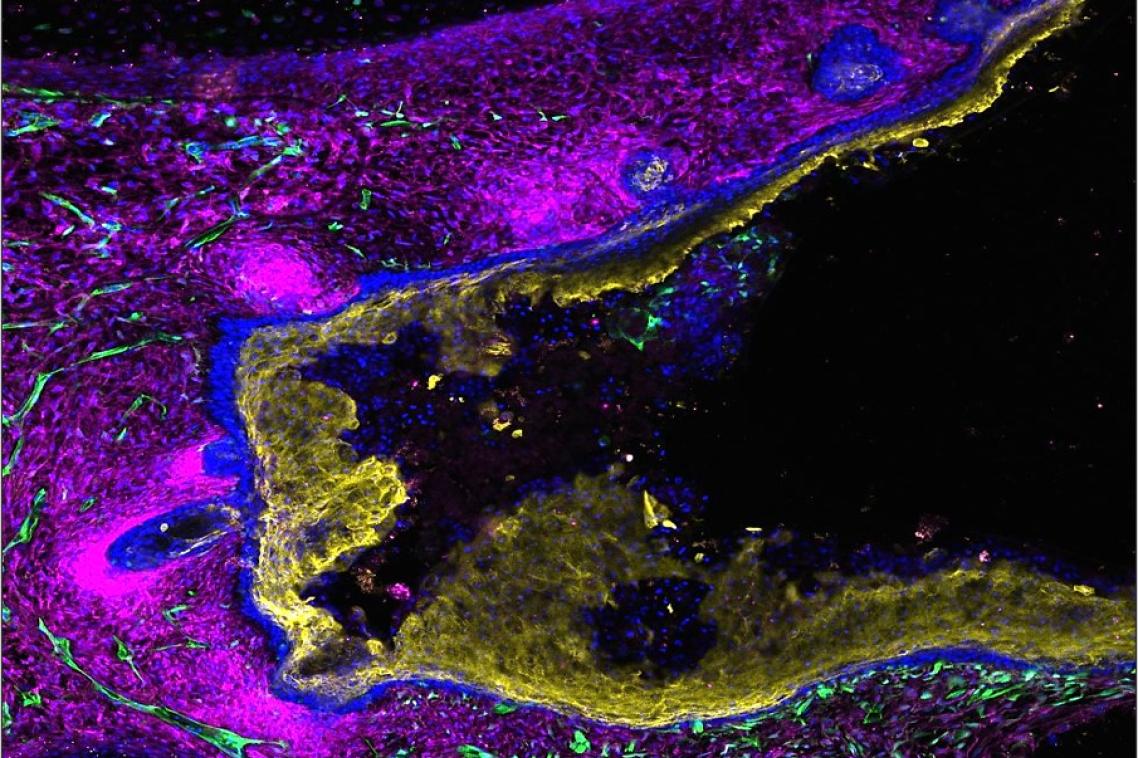Building healthier communities through research and innovation

UQ Frazer Institute researchers have used stem cells to create a replica of human skin.
Key points
- Explore some of the research from the Faculty of Health, Medicine and Behavioural Sciences that's making an impact for UQ's 2025 Research and Innovation Week.
- The collection of stories shines a spotlight on research advancing health, wellbeing and equity in our communities.
- From growing living skin to being a step closer to a drug for prostate cancer, learn more about the stories below.
World-first research using stem cells to grow skin
Dr Abbas Shafiee and Professor Kiarash Khosrotehrani from the Frazer Institute have been successful in growing fully functioning human skin in a lab.
The research was 6 years in the making and uses stem cells to create a replica of human skin, complete with blood vessels, capillaries, hair follicles, layers of tissues and immune cells.
Read more about the stem cell research
Using 3D printing to rebuild jaw bone
Professor Saso Ivanovski and Dr Reuben Staples from the School of Dentistry have used 3D printing technology to create bone scaffold to rebuild part of a man’s jaw.
The scaffold supported new bone growth, which allowed a dental implant with a new tooth to be inserted, and encouraged the regeneration of the jaw bone.
Read more about the 3D printing technology
UQ School of Dentistry researchers have created a 3D printed dental scaffold
Improving fetal alcohol spectrum disorder diagnosis
Dr Natasha Reid from the Child Health Research Centre led a study looking at the key features used in diagnosing Fetal Alcohol Spectrum Disorder (FASD) and how they related to prenatal alcohol exposure.
The key finding supports Australian guidelines that state there is no safe level of alcohol consumption for people who are pregnant or planning pregnancy.
Read more about the FASD research
Prostate cancer drug one step closer
Based on research that started almost 15 years ago, Professor Greg Monteith from the School of Pharmacy and Pharmaceutical Sciences is developing a new treatment for therapy-resistant prostate cancer.
The Queensland Emory Drug Discovery Initiative is advancing the drug, QED-203, toward clinical development.
Read more about the prostate cancer drug
Prioritising Indigenous-led prevention programs for rheumatic heart disease
Ms Lorelle Holland, proud Mandandanji woman and Senior Research Assistant Yumeng Cai from the School of Nursing, Midwifery and Social Work led research on rheumatic heart disease, an acquired but preventable heart disease, with more than 40 million cases worldwide.
Their research called for urgent action to stop Indigenous children and young adults dying from rheumatic heart disease due to culturally unsafe and inaccessible healthcare in Australia.
Read more about the rheumatic heart disease research
Protecting teens from dangerous digital influences
Following the popular Netflix series Adolescence, Professor Jolanda Jetten from the School of Psychology and Professor Alina Morawska from the Parenting and Family Support Centre provided advice on how to keep kids, particularly boys, safe online.
The article explains online indoctrination, and shares some of the signs to look out for.
Read more about the advice to protect teens online

ParaSTART
Since 2017 ParaSTART has provided people with high support needs with the support to safely and effectively participate in para sports.
One of those is frame running, an adapted running sport for people with disabilities who have difficulty with balance or walking.
Find out more about the ParaSTART program
Spotlighting perinatal depression for Men’s Health Week
With around 30,000 fathers and partners affected each year by paternal perinatal depression, Associate Professor Alka Kothari from the Medical School and postdoctoral research fellow Dr Beth O’Gorman from the School of Psychology shared research around the effects of this significant public health issue.
Read more about the perinatal depression research
Busting the common myths around vaccinations
Not everyone who is vaccine hesitant is anti-vax and this is just one of the misconceptions about vaccinations that Dr Amalie Dyda and Dr Lisa McHugh from the School of Public Health debunk.
Importantly they highlight the need for open and honest conversations with health care professionals.
Read more about the common myths around vaccinations

Optimising your circadian rhythm for World Sleep Day
How can sleep improve your wellbeing? Dr Oliver Rawashdeh from the School of Biomedical Sciences explains the importance of your circadian rhythm, and how a good night’s sleep impacts your brain, body and overall wellbeing.
Read more about the importance of your circadian rhythm
Uncovering the hidden challenges of healthcare for South Asian Australians
Dr Mehwish Nisar from the School of Health and Rehabilitation Sciences investigated the unique challenges faced by South Asian migrants living in Australia, when trying to navigate the healthcare system.
The research brings real-life immigrant experiences to the forefront to identify solutions to the barriers they face.
Read more about hidden challenges of healthcare
Culturally tailored interventions to combat type 2 diabetes
Dr Edmund Wedam Kanmiki and Professor Abdullah Mamun from UQ’s Poche Centre for Indigenous Health led research to understand the effectiveness of culturally appropriate programs in reducing type 2 diabetes in Indigenous communities.
The systematic review investigated programs aiming to prevent or manage type 2 diabetes among Aboriginal and Torres Strait Islander peoples under 25.
Read more about the type 2 diabetes interventions
How a tiny insect is transforming mental health research
Professor Barry Dickson from the Queensland Brain Institute uses the fruit fly Drosophila melanogaster to uncover how neural circuits generate complex behaviours, from movement to instinctive decision-making like mate choice.
His pioneering work mapping the fly brain is now driving new insights into how stress rewires neural connectivity, with implications for understanding anxiety and depression.
